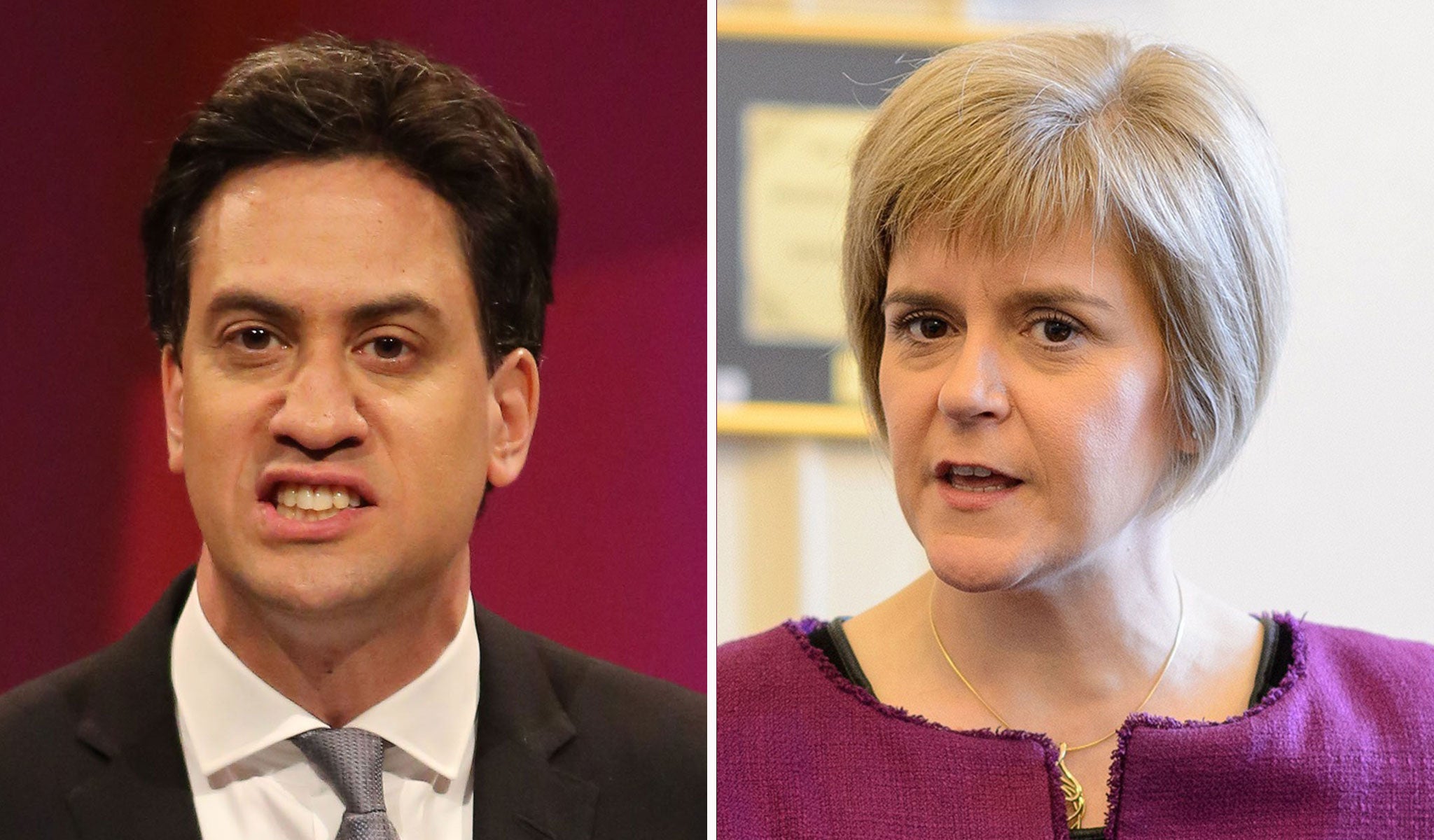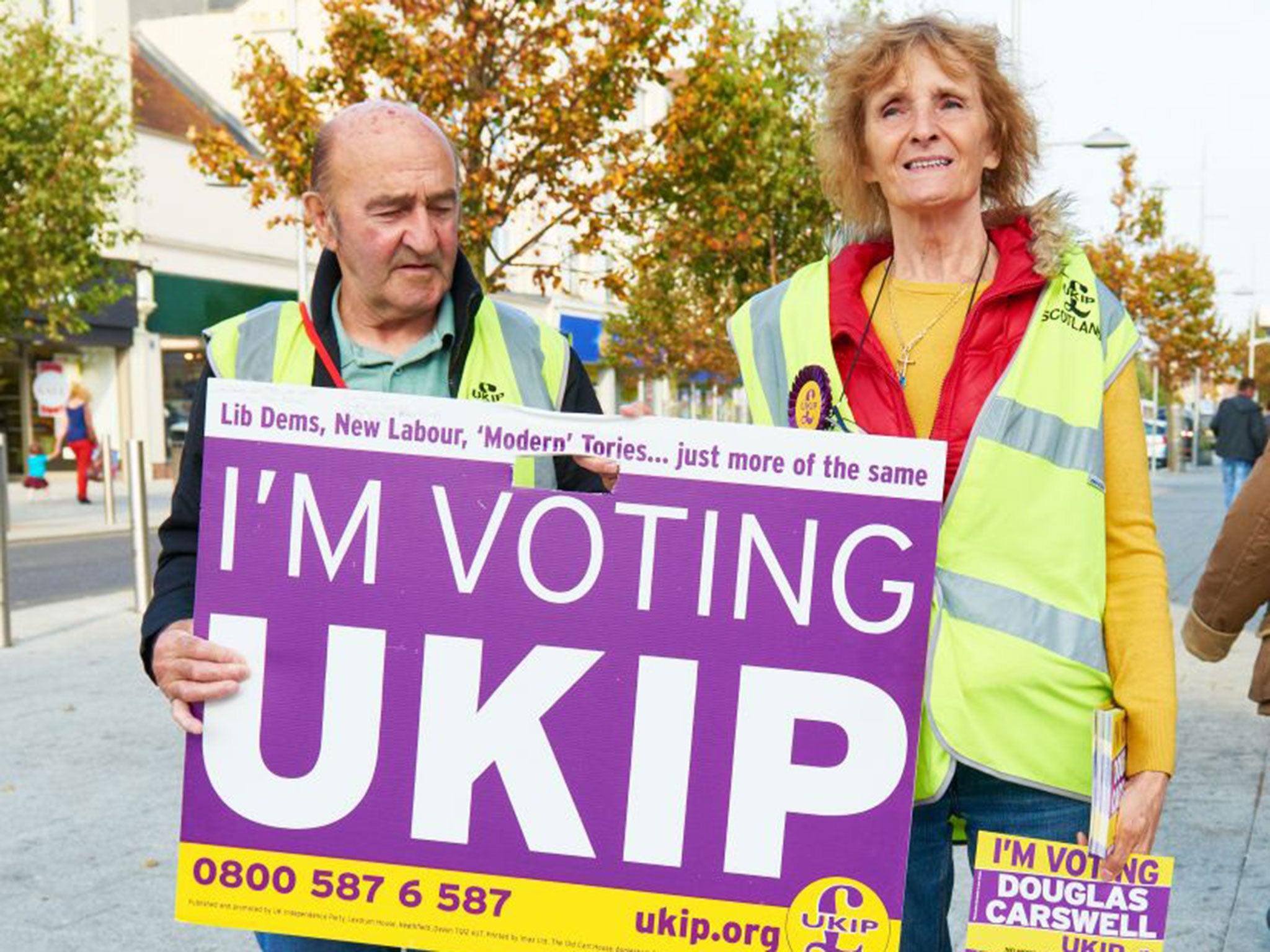General Election 2015: Prospect of Labour-SNP coalition makes one in four voters less likely to support Ed Miliband, says survey
Exclusive: The findings will boost Tory hopes that by talking up the possibility of the deal, they can win back former supporters who have switched to Ukip

Your support helps us to tell the story
From reproductive rights to climate change to Big Tech, The Independent is on the ground when the story is developing. Whether it's investigating the financials of Elon Musk's pro-Trump PAC or producing our latest documentary, 'The A Word', which shines a light on the American women fighting for reproductive rights, we know how important it is to parse out the facts from the messaging.
At such a critical moment in US history, we need reporters on the ground. Your donation allows us to keep sending journalists to speak to both sides of the story.
The Independent is trusted by Americans across the entire political spectrum. And unlike many other quality news outlets, we choose not to lock Americans out of our reporting and analysis with paywalls. We believe quality journalism should be available to everyone, paid for by those who can afford it.
Your support makes all the difference.The prospect of a post-election deal between Labour and the Scottish National Party makes one in four voters less likely to support Ed Miliband’s party, according to a new survey.
Pollsters ORB, which questioned 2,000 people, found that a potential Labour-SNP deal made 25 per cent less likely to vote Labour and 16 per cent more likely – a difference of nine points, which could be crucial in a tight election. Many of those saying such an agreement makes them more likely to vote Labour already intend to back Labour. Six in 10 people said such an arrangement would make no difference to how they vote.

People who intend to vote Ukip were most likely to be put off by the prospect of a Labour-SNP deal. Some 29 per cent of them said it would make them less likely to back Labour, while only 7 per cent said it would make that more likely.
Are you undecided about who to vote for on 7 May? Are you confused about what the parties stand for and what they are offering? Take this interactive quiz to help you decide who to vote for...
The findings will boost Conservative hopes that by talking up the possibility of such a deal, they can win back former Tory supporters who have switched to Ukip before the election in nine days.
The prospect is not putting off most Labour supporters: 31 per cent said a link-up with the SNP would make them more likely to back Mr Miliband’s party, while 16 per cent said it would make it less likely. Among Liberal Democrat supporters, a Lab-SNP deal would make them 27 per cent less likely to back Labour and only 13 per cent more likely.
The findings chime with reports from constituencies by Labour and Lib Dem officials that the Tory attacks on a Labour-SNP link-up are persuading former Tories to return “home” from Ukip.
Tory hopes of breaking the election deadlock were boosted when a poll by Lord Ashcroft, the party’s former deputy chairman, gave it a six-point lead and showed Ukip down. It put the Tories on 36 per cent (up two points on last week); Labour on 30 per cent (unchanged); Ukip on 11 per cent (down two points); the Lib Dems on 9 per cent (down one point) and the Greens on 7 per cent (up three points).
Meanwhile, a TNS survey in Scotland found that the momentum is still with the SNP. It put the party on 54 per cent (up two points on last week); Labour on 22 per cent (down two); the Conservatives on 13 per cent (unchanged); the Lib Dems on 6 per cent (unchanged); the Greens on 2 per cent (down one point) and Ukip on 2 per cent (up one). However, one in three people who intends to vote has not yet made their mind whom to support.
In recent days, Labour has used tougher language on a possible arrangement with the SNP in an attempt to halt the Tories’ campaign to exploit the issue. After initially ruling out a coalition, Mr Miliband has insisted there would be “no deal” of any kind.
But Nicola Sturgeon, the SNP leader, talked up the prospect of backing a minority Labour government, saying her party would vote for Labour’s plan to reduce university tuition fees in England and Wales even if there were a majority against it among English MPs. In a BBC TV interview, she said the SNP would vote for a Labour Queen’s Speech even if she did not agree with most of it.

The SNP leader told BBC Radio that she did have rows with her predecessor Alex Salmond but said that was “not very often”, and insisted she now had the final say. She said that even if the SNP won all 59 Scottish seats at the election, that would not be a mandate for another independence referendum.
Ms Sturgeon added: “In recent days we have seen the opposition parties resort to the fears and scare tactics that they always seem to fall back on. They are out of ideas – and they are running out of time.”
At the start of the election campaign, Jim Murphy, Labour’s leader in Scotland, said the forecast of a Labour wipe-out north of the border would change as election day got nearer. But his party’s prospects look bleaker than ever.
Labour’s strategy of trying to expose holes in the SNP’s demands for more greater economic power has made little impact. However, in Glasgow yesterday both Ed Balls, the shadow Chancellor, and Mr Murphy made a detailed attack on why the SNP’s sums do not add up. Mr Balls said: “The fundamental truth is that the SNP is committed to a fiscal approach for Scotland which rejects the pooling and sharing of resources across the United Kingdom.”
Join our commenting forum
Join thought-provoking conversations, follow other Independent readers and see their replies
Comments